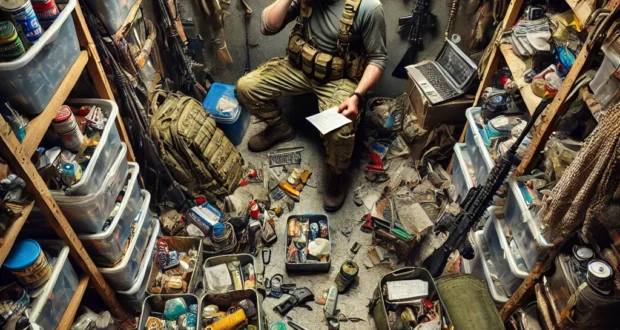Blog
Put on a reserve of survival!
When you live with readiness in mind … Whether as a prepper, except for grider or survival … Your home becomes more than a residence. It transforms into a readiness center.
Each shelf, container and drawer can store tools, supplies or equipment chosen to survive chaos. But ironically, if these supplies are buried in a mess, they lose power. Degreasing, often perceived as a minimalist or suburban problem, has an even greater need for those who are preparing for disruption. A disorganized survival supply is not a safety network … It’s responsibility.
To be really ready, your supply must be functional, available and purposeful. Rejection in this context is not about having less … It is about knowledge of what you have, trust that it works and be able to put your hands on it when the clock is ticking.
Why minimalism makes sense for survival
Minimalism may seem to be the opposite of preparation. Finally, preppers deliberately accumulate … ammunition, canned goods, fuel, tools. But a deeper definition of minimalism does not apply to deficiency.
It is about the purposefulness: preserving what serves your mission and removing what distracts attention. This is where minimalism and the way of thinking about experience intersect. Your equipment and stocks should exist to serve your readiness. If they are not based, expired, broken or duplicate outside of logic, they are a mess.
The debt allows you to sharpen the focus. Instead of wasting time during the crisis browsing rusty tools or expired reasons, you will find what you need. It also maintains the longevity of your necessary things, ensuring that they are stored in appropriate conditions and are not exposed to poor organization.
Redemption “just in case”
One of the most difficult things for a person focused on readiness is that some items “in case” have expired their usability. We often keep outdated equipment, additional equipment or surpluses, because we are afraid that the future is needed. But readiness is not collected. This is disciplined delivery.
Start by asking whether the element has a realistic number of useful and whether it works properly. A gas mask with a cracked gasket, a flashlight with corroded batteries or dried from the letter from 1999 is not a preparation … This is false confidence.
Rate everything with a lens of utility and reliability. If something can be better fulfilled by a modern, more versatile tool, let the old one.
Organize according to the script, not the category
Traditional deposition often includes sorting by the type of room or object. For survival, organizing according to the script is a more effective strategy. Think in terms of events: darkening of the network, evacuation of fires, civic anxieties or economic breakdown. What equipment do you need in any case? Where is it? Can you achieve this under pressure?
Building “mission sets” or scenario containers ensures a quick response. Your darkening set should have working flashlights, fresh batteries, candles, sunlight and spare charging solutions.
Your evacuation kit should contain documents, cash and travel equipment in the brand, which is always ready. Rejection in this way reduces redundancy and increases the effectiveness of your locker.
Maintenance is readiness
Too often, preparation becomes a one -off event: mass order of MRE, travel to the surplus store, and then storage. But the preparation of survival is not static – it is discipline. The food expires. Rubber seals are spreading. Firestarters degrade. Water containers grow mold. The debt is maintenance and should be planned.
Set a quarterly review of your entire cache. Check the expiry date. Test batteries and fuel. Make supplies. This is not busy … It’s a readiness to the battle.
Lasarka without power is dead weight. A water filter without a filter element is a trap. When your locker is slim, present and verified, your confidence increases.
Mental brightness of order
Chaos raises stress. The destruction increases indecision. In the event under high pressure, your advantage of survival is not just equipment … it’s clarity. An organized space supports a focused mind.
When your shelves are marked, the packaging has improved, the tools mounted, the whole system begins to act like a ship’s engine salon: efficient, intentional, powerful.
Punction also helps in training. When items are easy to locate, it is easier to practice skills, perform dry gears and teach others. You not only experience … you act. The greater the control over your space, the greater the control you will have under the influence of stress.
Teach and share the way of thinking
A powerful way to maintain a rejection discipline is to share the value of the organization with others in your circle. If you are part of a preparatory group or a local help network, it conducts an example.
Show others how a clean, categorized storage system increases not only aesthetics, but performance. Trade or transfer duplicates or outdated equipment to newer prepper who build their supplies.
The declaration also teaches resourcefulness. You learn to prioritize to treat multi -functional tools, reduce waste and extend the life of the necessary equipment. Your experience becomes a plan for others. And in the crisis your well -organized system can become a community resource.
Your survival supply is just as effective as the ability to implement it!
Stripping is not optional – it’s tactical!
Your survival supply is just as effective as the ability to implement it. In this light, rejection becomes a smaller choice of lifestyle and a more tactical necessity.
It’s not about pinterest worthy pantry. It’s about readiness. It is about making a home, a deliberate space that not only stores things … but serves your mission.
Ultimately, you are preparing not only for survival, but for prosperous by chaos. Pure space supports a clear mind. The simplified supply supports the tightened strategy. And when the moment comes, you will be ready … without kicking stacks, but moving with the goal.

